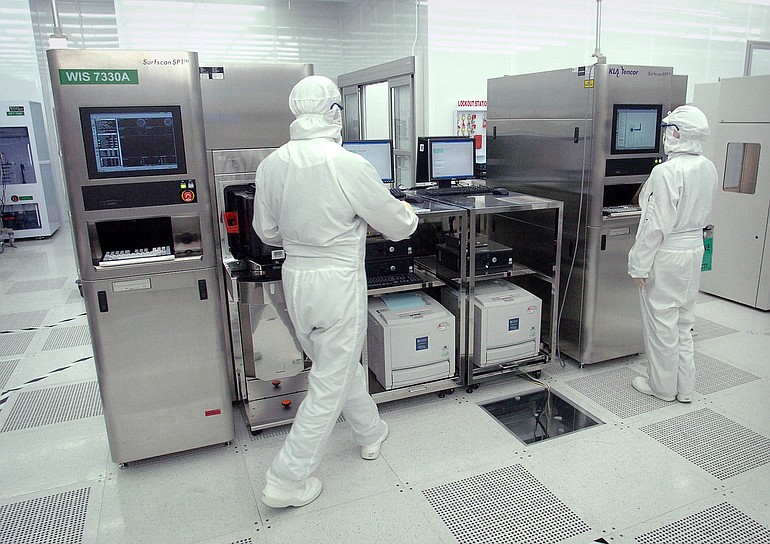SHIRAKAWA, Japan — About 40 miles west of the crippled Fukushima nuclear plant, another kind of crisis may be unfolding, this one striking at the heart of the world’s multibillion-dollar market for smartphones, portable music players and other cutting-edge electronics.
The powerful earthquake that rocked Japan last month knocked out a hillside factory owned by Shin-Etsu Chemical Co. Little known outside industry circles, Shin-Etsu is the world’s biggest producer of advanced silicon wafers, a key material needed for the manufacturing of semiconductors. It’s also the parent of Vancouver-based SEH America, a silicon wafer manufacturer that employs about 850 people in Clark County.
Shin-Etsu Chemical Co. is the parent of east Vancouver-based SEH America, which employs about 850 people in Clark County.
“SEH-Japan management and employees are working extremely hard to bring all of their operations up to full capacity,” said Pat McDonnell, senior director of site services in Vancouver. “SEH America is running at maximum capacity to support our sister facilities in Japan. Additionally, we are doing what we can to support the relief funds goods needed to support the displaced citizens in Japan.”
Shin-Etsu Chemical Co. is the parent of east Vancouver-based SEH America, which employs about 850 people in Clark County.
"SEH-Japan management and employees are working extremely hard to bring all of their operations up to full capacity," said Pat McDonnell, senior director of site services in Vancouver. "SEH America is running at maximum capacity to support our sister facilities in Japan. Additionally, we are doing what we can to support the relief funds goods needed to support the displaced citizens in Japan."
Shin-Etsu’s Shirakawa plant represented 20 percent of the world capacity to produce the building blocks on which some key high-technology products depend. The disaster could prove to be a major concern for chip makers, including Intel Corp. and Toshiba Corp., that purchase wafers from Shin-Etsu, analysts said.
But it also has turned the spotlight on a much broader problem in the global economy: Companies around the world often rely on small networks of suppliers that might be thousands of miles away. Many of those suppliers are in Japan.
Already, quake-related shortages of automotive electronic sensors made by Hitachi Ltd. have affected vehicle production in Germany, Spain, France and Shreveport, La.
The crisis also is expected to slash the supply of the Toyota Prius, and contribute to higher passenger car prices in the U.S., where temporary worker layoffs already have hit Ford Motor Co., General Motors Corp. and some Japanese auto firms.
Chinese computer maker Lenovo Group Ltd. was among the latest to warn that a shortage of components from Japan could crimp supplies of finished products.
The likelihood of continued disruptions sparked a run-up in the price of memory chips and some parts, and it is almost certain to lead to a rethinking of global production and logistics in which a natural disaster could have such broad effects.
“If one (plant) goes offline it doesn’t throw your whole production schedule off,” said Kenneth Grossberg, a business professor at Waseda University in Tokyo. “How could you make yourself so vulnerable?”
The unusually large concentration of production at a single site such as Shin-Etsu’s Shirakawa campus, he said, might reflect a wider tendency to centralize operations. The disaster and its aftermath also revealed just how far some companies had pushed the just-in-time supply system. The practice allows companies to reduce inventories, freeing up cash for more profitable use elsewhere. But in managing supplies so tightly, companies also leave little margin for adjusting.
France’s PSA Peugeot-Citroen usually keeps just a 10-day supply of Hitachi air-flow sensors on hand. With Hitachi controlling more than half of the world’s production of this obscure, $90-retail-priced component, Peugeot and General Motors, among others, had little choice but to cut production when those parts began to flow more slowly.
And it’s not clear when production will pick up. Plants operated by Panasonic Corp., Hitachi, Shin-Etsu and other leading Japanese companies are mostly up and running now, but only at about 50 percent capacity, said Endou Katsuei, executive director of Shinwa Planning Co., which is managing the zone.
Masayoshi Esashi, an engineering professor, worries that even if region’s tech companies return to full production soon, they still will probably lose market share — and jobs.
That’s clearly at stake at Shin-Etsu in Shirakawa, about 100 miles north of Tokyo. Company officials have given no timetable for when production is likely to restart.
While there’s no visible sign of damage on the buildings’ gray exterior, local residents and business owners said the plant couldn’t have escaped some damage.
“Shin-Etsu had huge damage inside; machines and equipment fell with a crash,” said Toshiaki Ishi, 49, a lifelong resident of the area, as he relayed what friends who work at the plant told him.
Employees were asked to stay home.
Making silicon ingots and slicing them into wafers takes weeks, and is a precise and delicate process. Analysts said it’s possible that ingot furnaces, typically 12 to 15 feet tall, could have toppled or shaken so hard that ingots dropped inside the machines, breaking internal equipment parts.
It’s hard to know the extent of Shin-Etsu’s problems and the looming capacity crunch because the company has disclosed little information about the damage and the overall supply situation, said Joel Scheiman, a Tokyo analyst for MF Global Holdings Ltd. who has followed Japan’s chemical industry for 25 years.
For now, he and other analysts said, there appears to be enough 300-millimeter wafers to go around through May.
Akira Minamikawa, vice president of iSuppli’s Japan research, doesn’t see Shin-Etsu’s Shirakawa plant returning to full strength until October. That means the company will most likely be supplying first-tier customers first, such as Toshiba; Taiwan Semiconductor Manufacturing Co., owner of Camas-based WaferTech; and Elpida Memory Inc.



